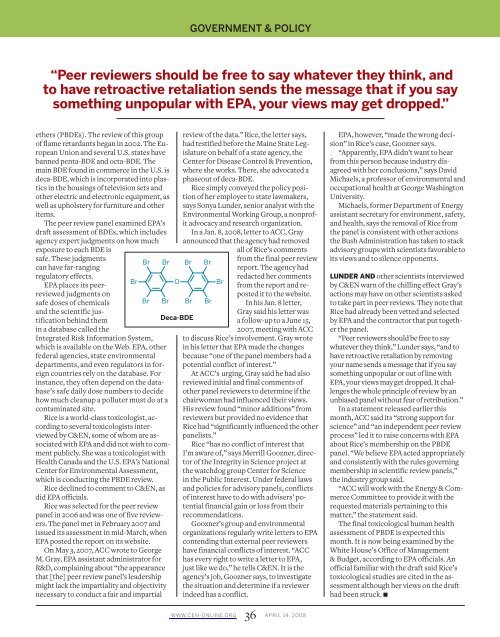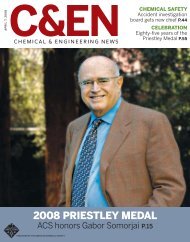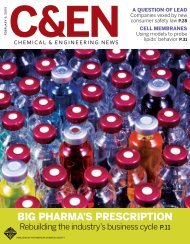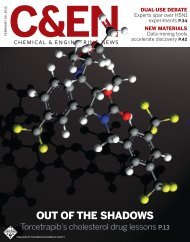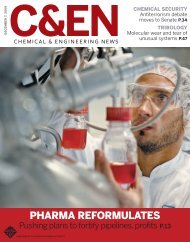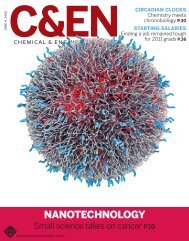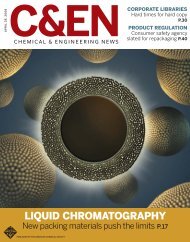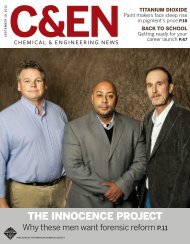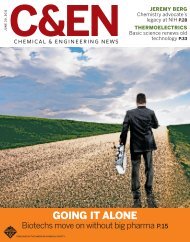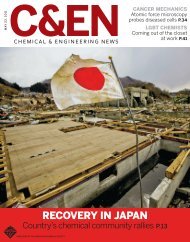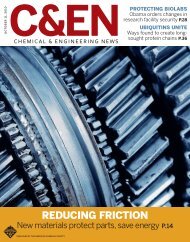Chemical & Engineering News Digital Edition - Institute of Materia ...
Chemical & Engineering News Digital Edition - Institute of Materia ...
Chemical & Engineering News Digital Edition - Institute of Materia ...
You also want an ePaper? Increase the reach of your titles
YUMPU automatically turns print PDFs into web optimized ePapers that Google loves.
GOVERNMENT & POLICY<br />
“Peer reviewers should be free to say whatever they think, and<br />
to have retroactive retaliation sends the message that if you say<br />
something unpopular with EPA, your views may get dropped.”<br />
ethers (PBDEs). The review <strong>of</strong> this group<br />
<strong>of</strong> flame retardants began in 2002. The European<br />
Union and several U.S. states have<br />
banned penta-BDE and octa-BDE. The<br />
main BDE found in commerce in the U.S. is<br />
deca-BDE, which is incorporated into plastics<br />
in the housings <strong>of</strong> television sets and<br />
other electric and electronic equipment, as<br />
well as upholstery for furniture and other<br />
items.<br />
The peer review panel examined EPA’s<br />
draft assessment <strong>of</strong> BDEs, which includes<br />
agency expert judgments on how much<br />
exposure to each BDE is<br />
safe. These judgments<br />
can have far-ranging<br />
regulatory effects.<br />
EPA places its peerreviewed<br />
judgments on<br />
safe doses <strong>of</strong> chemicals<br />
and the scientific justification<br />
behind them<br />
in a database called the<br />
Br<br />
Br<br />
Br<br />
Br Br<br />
Integrated Risk Information System,<br />
which is available on the Web. EPA, other<br />
federal agencies, state environmental<br />
departments, and even regulators in foreign<br />
countries rely on the database. For<br />
instance, they <strong>of</strong>ten depend on the database’s<br />
safe daily dose numbers to decide<br />
how much cleanup a polluter must do at a<br />
contaminated site.<br />
Rice is a world-class toxicologist, according<br />
to several toxicologists interviewed<br />
by C&EN, some <strong>of</strong> whom are associated<br />
with EPA and did not wish to comment<br />
publicly. She was a toxicologist with<br />
Health Canada and the U.S. EPA’s National<br />
Center for Environmental Assessment,<br />
which is conducting the PBDE review.<br />
Rice declined to comment to C&EN, as<br />
did EPA <strong>of</strong>ficials.<br />
Rice was selected for the peer review<br />
panel in 2006 and was one <strong>of</strong> five reviewers.<br />
The panel met in February 2007 and<br />
issued its assessment in mid-March, when<br />
EPA posted the report on its website.<br />
On May 3, 2007, ACC wrote to George<br />
M. Gray, EPA assistant administrator for<br />
R&D, complaining about “the appearance<br />
that [the] peer review panel’s leadership<br />
might lack the impartiality and objectivity<br />
necessary to conduct a fair and impartial<br />
O<br />
Deca-BDE<br />
review <strong>of</strong> the data.” Rice, the letter says,<br />
had testified before the Maine State Legislature<br />
on behalf <strong>of</strong> a state agency, the<br />
Center for Disease Control & Prevention,<br />
where she works. There, she advocated a<br />
phaseout <strong>of</strong> deca-BDE.<br />
Rice simply conveyed the policy position<br />
<strong>of</strong> her employer to state lawmakers,<br />
says Sonya Lunder, senior analyst with the<br />
Environmental Working Group, a nonpr<strong>of</strong>it<br />
advocacy and research organization.<br />
In a Jan. 8, 2008, letter to ACC, Gray<br />
announced that the agency had removed<br />
all <strong>of</strong> Rice’s comments<br />
Br Br<br />
Br<br />
Br<br />
Br<br />
from the final peer review<br />
report. The agency had<br />
redacted her comments<br />
from the report and reposted<br />
it to the website.<br />
In his Jan. 8 letter,<br />
Gray said his letter was<br />
a follow-up to a June 15,<br />
2007, meeting with ACC<br />
to discuss Rice’s involvement. Gray wrote<br />
in his letter that EPA made the changes<br />
because “one <strong>of</strong> the panel members had a<br />
potential conflict <strong>of</strong> interest.”<br />
At ACC’s urging, Gray said he had also<br />
reviewed initial and final comments <strong>of</strong><br />
other panel reviewers to determine if the<br />
chairwoman had influenced their views.<br />
His review found “minor additions” from<br />
reviewers but provided no evidence that<br />
Rice had “significantly influenced the other<br />
panelists.”<br />
Rice “has no conflict <strong>of</strong> interest that<br />
I’m aware <strong>of</strong>,” says Merrill Goozner, director<br />
<strong>of</strong> the Integrity in Science project at<br />
the watchdog group Center for Science<br />
in the Public Interest. Under federal laws<br />
and policies for advisory panels, conflicts<br />
<strong>of</strong> interest have to do with advisers’ potential<br />
financial gain or loss from their<br />
recommendations.<br />
Goozner’s group and environmental<br />
organizations regularly write letters to EPA<br />
contending that external peer reviewers<br />
have financial conflicts <strong>of</strong> interest. “ACC<br />
has every right to write a letter to EPA,<br />
just like we do,” he tells C&EN. It is the<br />
agency’s job, Goozner says, to investigate<br />
the situation and determine if a reviewer<br />
indeed has a conflict.<br />
WWW.CEN-ONLINE.ORG 36 APRIL 14, 2008<br />
EPA, however, “made the wrong decision”<br />
in Rice’s case, Goozner says.<br />
“Apparently, EPA didn’t want to hear<br />
from this person because industry disagreed<br />
with her conclusions,” says David<br />
Michaels, a pr<strong>of</strong>essor <strong>of</strong> environmental and<br />
occupational health at George Washington<br />
University.<br />
Michaels, former Department <strong>of</strong> Energy<br />
assistant secretary for environment, safety,<br />
and health, says the removal <strong>of</strong> Rice from<br />
the panel is consistent with other actions<br />
the Bush Administration has taken to stack<br />
advisory groups with scientists favorable to<br />
its views and to silence opponents.<br />
LUNDER AND other scientists interviewed<br />
by C&EN warn <strong>of</strong> the chilling effect Gray’s<br />
actions may have on other scientists asked<br />
to take part in peer reviews. They note that<br />
Rice had already been vetted and selected<br />
by EPA and the contractor that put together<br />
the panel.<br />
“Peer reviewers should be free to say<br />
whatever they think,” Lunder says, “and to<br />
have retroactive retaliation by removing<br />
your name sends a message that if you say<br />
something unpopular or out <strong>of</strong> line with<br />
EPA, your views may get dropped. It challenges<br />
the whole principle <strong>of</strong> review by an<br />
unbiased panel without fear <strong>of</strong> retribution.”<br />
In a statement released earlier this<br />
month, ACC said its “strong support for<br />
science” and “an independent peer review<br />
process” led it to raise concerns with EPA<br />
about Rice’s membership on the PBDE<br />
panel. “We believe EPA acted appropriately<br />
and consistently with the rules governing<br />
membership in scientific review panels,”<br />
the industry group said.<br />
“ACC will work with the Energy & Commerce<br />
Committee to provide it with the<br />
requested materials pertaining to this<br />
matter,” the statement said.<br />
The final toxicological human health<br />
assessment <strong>of</strong> PBDE is expected this<br />
month. It is now being examined by the<br />
White House’s Office <strong>of</strong> Management<br />
& Budget, according to EPA <strong>of</strong>ficials. An<br />
<strong>of</strong>ficial familiar with the draft said Rice’s<br />
toxicological studies are cited in the assessment<br />
although her views on the draft<br />
had been struck. ■


